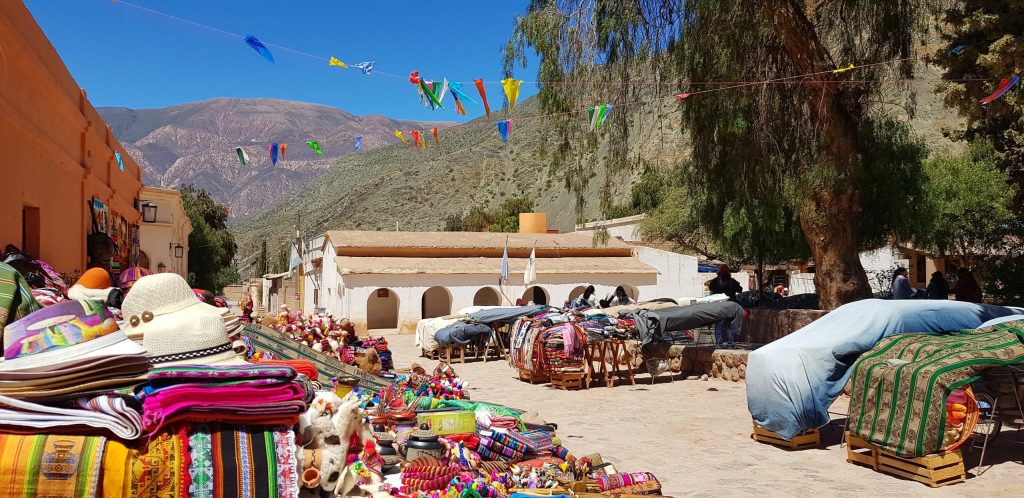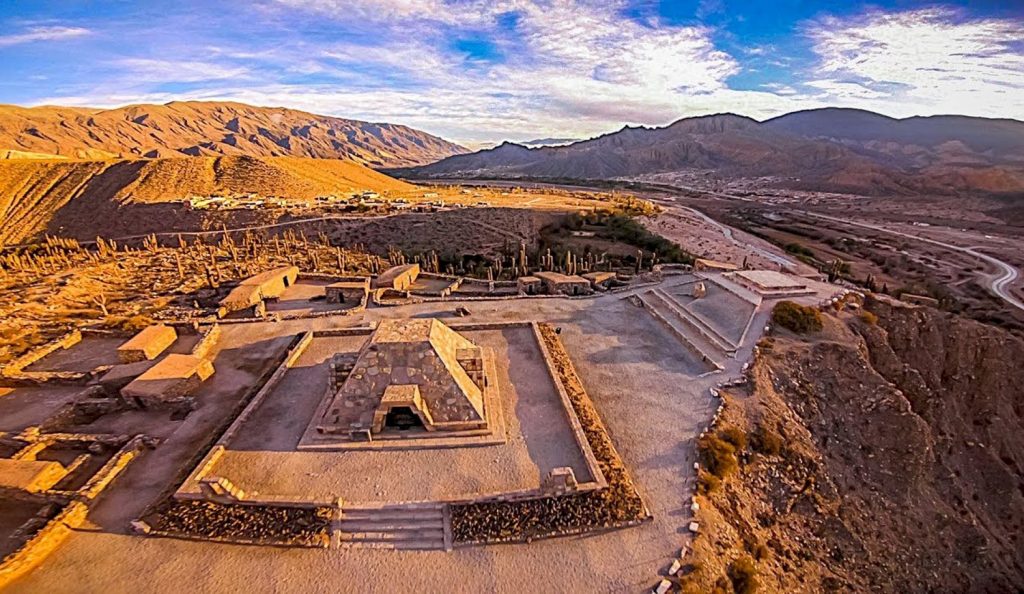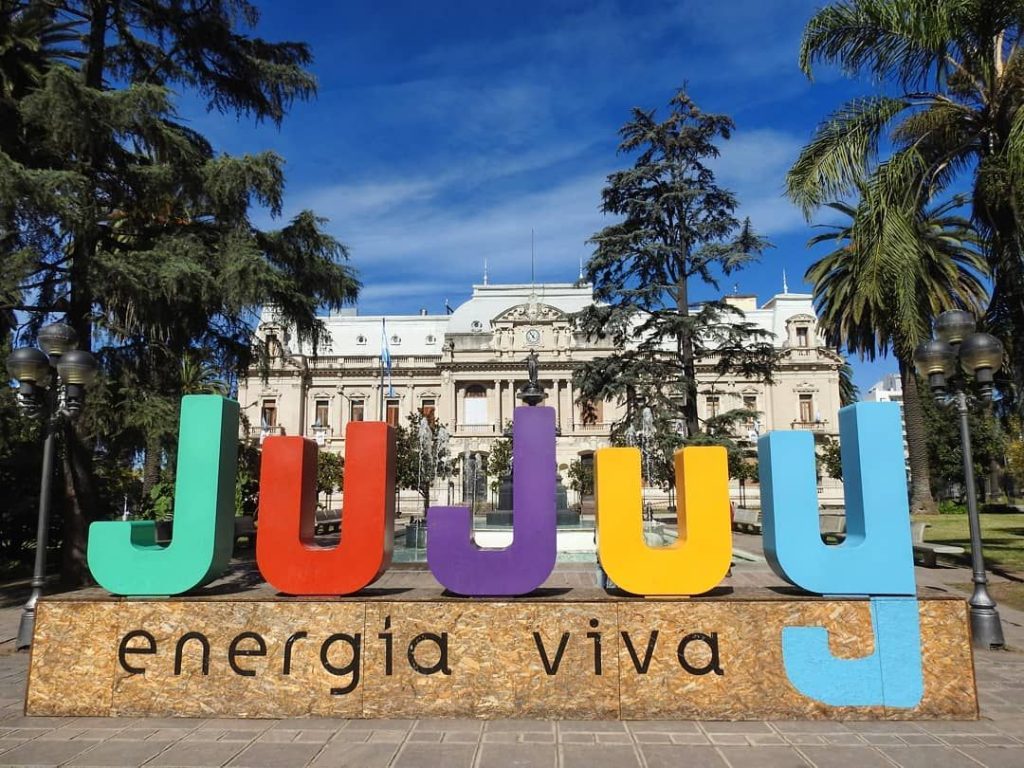
By KAIT MCMURDO May 8, 2024
Nestled in the heart of Argentina’s northwest, the province of Jujuy beckons travelers with its rich tapestry of flavors, vibrant landscapes, and ancient traditions. With breathtaking vistas that stretch from the rugged Andes to the salt-crusted expanses of the Salinas Grandes, this enchanting province is the perfect destination for your next adventure. Whether you’re a seasoned explorer or a curious wanderer, Jujuy promises to leave a mark on your soul.
Jujuy’s gastronomy is more than just sustenance; it’s a portal to the past. Each dish carries a story—a whisper of generations past, a celebration of the land. As you explore the winding streets of Jujuy, let your taste buds guide you through a journey of authenticity and tradition. But it’s not just the food that captivates; it’s the vibrant ancestral culture that pulses through every corner. As Jorge Villar, Broker Owner at Coldwell Banker Plaza Real Estate, aptly puts it, “Jujuy is a place full of charm, with breathtaking landscapes and a vibrant ancestral culture, surpassed only by the growing forces of its people.” The warmth and hospitality of the locals envelop you, inviting you to dance to the rhythm of folk music and immerse yourself in age-old traditions.
Victoria Salas, Broker at Coldwell Banker Plaza Real Estate, echoes this sentiment: “It is a place full of charm, with breathtaking landscapes and a vibrant ancestral culture, surpassed only by the growing forces of its people.” Indeed, Jujuy is a symphony of colors, flavors, and traditions—an experience that lingers long after you’ve returned home.
So come, wander through the cobblestone streets of Tilcara, where history whispers secrets to those who listen. Stand in awe before the multicolored layers of Cerro de los Siete Colores in Purmamarca, and let the wind carry tales of ancient civilizations. Jujuy is more than a destination; it’s an invitation to connect—with the land, with the past, and with the beating heart of Argentina’s northwest.

Where do you live? I live in the beautiful province of Jujuy, in Argentina! It is a place full of charm, with breathtaking landscapes and a vibrant ancestral culture, surpassed only by the growing forces of its people. I am proud to call Jujuy my home.
What is the perfect weekend day like? Without a doubt, a weekend in my homeland is the perfect balance between work and enjoyment.
After a busy week-long pace, Saturday kicks off with an invigorating workout routine, whether it’s in the gym or outdoors. Then, I meet with colleagues and business partners for a relaxed breakfast, in the most traditional café of San Salvador de Jujuy, the provincial capital, to take stock of the week and enjoy how the city begins to move.
I take advantage of the fact that the distances are short and it is very easy to move in the afternoon to disconnect from work and immerse myself in the natural beauty at the Termas de Reyes for a swim in warm waters or a moment in the spa. As evening falls, I return to the city and get ready for an evening of networking at some fine dining restaurant where I can delight in gourmet dishes prepared with fresh local ingredients accompanied by a good wine.
To cap off the weekend, Sunday is a day to relax and recharge. It can be a quiet morning at home, enjoying a late breakfast with my family or exploring some hidden corner such as El Carmen and its relaxing natural dikes or San Antonio with its delicious typical gaucho food. Whether lounging at home or exploring new horizons, the weekend in Jujuy is always full of opportunities for personal and professional growth, all while enjoying the beauty and unique culture of this wonderful region of northern Argentina. It’s the perfect balance of work and play!
What are the common modes of transportation there? We have the necessary infrastructure for you to move quickly and comfortably both inside and outside our province. This is possible thanks to the (free) road network as well as air transport.
Jujuy is located in the heart of South America and in the far north of Argentina. National Routes connect Jujuy with the rest of Argentina, southern Bolivia and northern Chile. The province is crossed by the “Paso de Jama” Bioceanic Corridor, a first-class free road system throughout its length.
The “Dr. Horacio Guzmán” International Airport (JUJ) connects it with the main air stations of the country such as Buenos Aires (BUE), Mendoza (MDZ), Iguazú (IGR) and Córdoba (COR). We have optimal connectivity.
Tell us about the foods your area is known for. Jujuy’s gastronomy is characterized by its direct connection with the land, each dish tells a story, a tradition and a feeling that is transmitted from generation to generation.
As a fact for travelers, it should be noted that one of the favorite accompaniments for any meal in the north is the Jujuy High Altitude Wine. These vines, grown at extreme altitudes, produce world-renowned wines, especially those made in the majestic Quebrada de Humahuaca.
It is unforgivable to visit Jujuy and leave without savoring emblems such as: humitas are a paste of grated corn, herbs and cheese wrapped in corn husks (called “chala”), they can be sweet or savory. Llama meat is the protagonist in several dishes, from llama loin with Andean potatoes to llama milanesa, this meat is a unique experience for the palate.
Also, don’t miss the buñuelos, cane honey, silverside, chili, tomato, pepper and local strawberries. Jujuy’s gastronomy is a journey of authentic and traditional flavors that will connect you with the culture and passion of this beautiful province.
What is your favourite meal, at home or at a restaurant? Accompanied meals are always savored a little better, we have first-class gastronomic establishments, some traditional and others specialty, where you can always order a good locro, a hearty and comforting stew made from corn, pork, beef, chorizo and a variety of vegetables such as pumpkin, potatoes and onions.
Another dish that cannot be missing and is a classic, is humita. These are similar to tamales, but are made with ground baby corn, to which cheese, onions, and spices are added. They are wrapped in corn husks and steamed, resulting in a sweet and savory bite at the same time. Excellent occasion to bring the family together as you could be a delicious barbecue.
And of course, we can’t forget the delicious empanadas from Jujuy. With their crispy dough and juicy, well-seasoned filling, these empanadas are a true delicacy for any self-respecting Jujuyeño.
Where do you recommend someone vacation in your region and why? As a Jujuy native at heart, I am excited to be able to share with you the wonderful experience of visiting Jujuy. This land full of colors, flavors, and ancestral traditions has so much to offer that you won’t want to miss the opportunity to explore.
Imagine walking through the cobblestone streets of Tilcara, surrounded by the towering mountains of the Quebrada de Humahuaca, while enjoying the vibrant colors of the local markets and the sound of folk music filling the air.
Another unmissable recommendation is Purmamarca, where you can marvel at the incredible Cerro de los Siete Colores and get lost in its streets full of history and culture. Don’t forget to try the gastronomic delights of the region, such as humitas, empanadas jujeñas and the famous locro, which will leave your palate more than satisfied.
And I can’t fail to mention the magical Salinas Grandes, a vast salt desert that stretches as far as the eye can see and offers a unique and unforgettable experience in the explosive glamping domes of Luxury Camp.
But best of all is the warmth and hospitality of its people. Here you will always be welcomed with open arms and you will be able to enjoy the company of friendly people who are always willing to share their culture and traditions with those who visit us.
So I invite you all to come and discover for yourselves the beauty and charm of Jujuy. I assure you that it will be an experience that you will remember forever.
What is your favourite recreational or leisure time activity? I’m just going to say that from north to south what moves the whole of Argentina is the passion for football and in Jujuy it is no exception. In every corner of our geography you will find a court to play and have fun.
But if there is one activity that differentiates the people of Jujuy, it is the respect and gratitude to the Pachamama, Mother Earth, it is not so recreational, but it is a reason for union and celebration for families and friends.
If it is recreational, I must say that the Jujuy Carnival is a celebration deeply rooted in the culture and identity of the province. It is a time of joy, color and traditions that brings together people of all ages to enjoy one of the most important festivals of the year.
Is there a specialty your area is known for? At first glance many consider Jujuy as small and without much to offer, but it is a province with a diversified economy, where several activities play an important role in its economic development.
Some of the main economic activities of Jujuy are: agriculture that allows the cultivation of sugar cane, tobacco, citrus, quinoa, corn and tropical fruits. The region has fertile land and a favorable climate that favors agricultural production.
Jujuy has a rich mineral base, with important deposits of minerals such as lithium, gold, zinc, lead and copper. Mining is a significant economic activity in the province, especially in the Salar de Olaroz, where one of the largest lithium reserves in the world is located.
We are a pioneer in the development of renewable energy in Argentina, we have wind and solar projects that take advantage of the abundant natural resource available, thus contributing to the generation of clean and sustainable energy.
The industry in Jujuy encompasses various sectors, including the food, textile, brewing, and dairy industries. The province has industrial parks and free zones that encourage investment and industrial development in the region.
Share a little known but interesting fact about the area/region: In August, the people of Jujuy evoke Mother Earth and are grateful for the fruits received throughout the year, as we learned from our grandparents, who in turn learned it from theirs.
The “corpachada” is the ritual of feeding the Pachamama. Through a circular well, products of nature, food, beverages, coca leaves are offered to Mother Earth as an act of gratitude, accompanied by prayers and requests.
Families, friends, neighbors and tourists, united around one of the most traditional Andean rituals of the Inca culture, thank you and receive your blessing. The air is filled with celebration of life, the aromas of frankincense, myrrh, rosemary and koa float, to smoke and cleanse of negative energies. Throughout the month, the people of Jujuy take the opportunity to “smoke” their loved ones, pets, and belongings such as vehicles and homes, to protect them from bad omens such as envy.
If you were to live in any other region where we have a Coldwell Banker presence, where would it be and why? One of the regions that catches my eye is the West Coast of the United States, especially California.
California is known for its vibrant economy, thriving real estate market, and laid-back, healthy lifestyle. With dynamic cities like Los Angeles, San Francisco, and San Diego, there is a wide range of opportunities in real estate, from luxury residential properties to innovative commercial developments.

Territory Summary:
San Salvador de Jujuy, the capital of Jujuy province in northwestern Argentina, boasts a rich colonial history dating back to its founding on April 19, 1593. The city owes its name to Francisco de Argañaraz y Murguía, who established it during the Spanish colonization era. The term “San Salvador” reflects the Spaniards’ religious devotion, while “jujuy” derives from Quechua, signifying the “river that speaks” or the “river of the lagoons.” This strategic location along the route between Upper Peru (now Bolivia) and Tucumán made San Salvador de Jujuy a hub for commerce and cultural exchange. Spanish and mestizo settlers flocked to the city, contributing to its growth and development during the 17th and 18th centuries.
Key Facts:
- Population: 800,000
- Language(s) Spoken: Spanish
- Climate: The province of Jujuy has a subtropical climate with a dry season1. The average annual temperature is 18º C, with maximums of 32º C in summer1. Rainfall is scarce in winter and abundant in summer, especially in the southeast of the territory1. The climate in the western sector is arid in the high mountains, with average temperatures below 12°C, marked daily temperature ranges and little precipitation in the form of snow.
- Currency: Peso Argentino

Industry Facts:
Types of Architecture: Colonial, Sustainable, Modern and Historic

 Facebook
Facebook
 X
X
 Pinterest
Pinterest
 Copy Link
Copy Link


